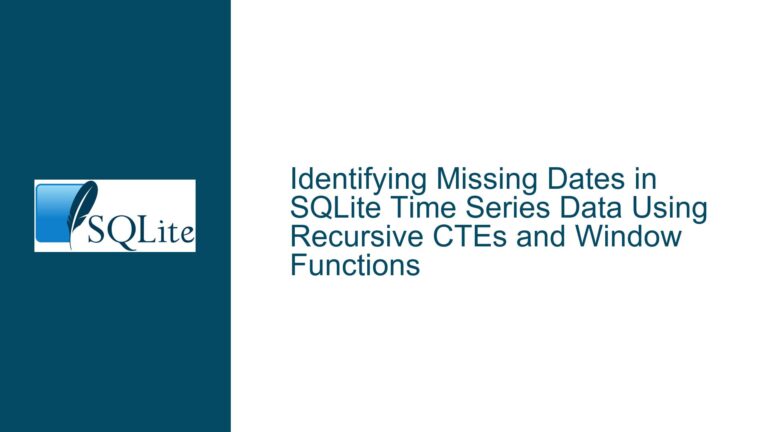Retrieving Column Names from SQLite Tables: Solutions and Common Pitfalls
Understanding Column Name Extraction Methods in SQLite
Issue Overview: Extracting Column Names Without Additional Metadata
The core challenge discussed revolves around retrieving only the column names from a SQLite table while excluding additional metadata such as data types, constraints, or primary key information. The original poster (OP) attempted methods like querying sqlite_master to extract the CREATE TABLE statement and using PRAGMA table_info, but faced issues with unwanted data or syntax errors. This problem is particularly relevant for users migrating from SQL Server, where INFORMATION_SCHEMA.COLUMNS provides a straightforward way to list column names. SQLite’s schema introspection mechanisms differ significantly, leading to confusion when attempting to isolate column names.
Key challenges include:
- Parsing the
CREATE TABLEstatement returned bysqlite_master, which includes extraneous details like data types and constraints. - Version compatibility issues with SQLite’s
PRAGMAfunctions, especially in older versions (pre-3.16.0) wherePRAGMAcannot be used inSELECTstatements. - Syntax misunderstandings, such as omitting quotes around table names or misusing the
pragma_table_infofunction in outdated SQLite environments.
Root Causes of Column Name Retrieval Failures
1. Reliance on sqlite_master Without Parsing
The sqlite_master table stores the raw CREATE TABLE statement as a string. While this contains column definitions, extracting only the column names requires parsing the string, which is error-prone due to:
- Variability in column definitions (e.g.,
[Time] datetimevs.Time datetime). - Nested clauses like
CHECKconstraints orCOLLATErules. - Table names with spaces or special characters (e.g.,
[LogData1]vs.LogData1).
Example:
SELECT sql FROM sqlite_master WHERE tbl_name = 'LogData1';
Returns:
CREATE TABLE [LogData1] ([Id] INTEGER PRIMARY KEY, [Time] datetime, ...)
Parsing this to extract Id, Time, etc., requires regex or string manipulation, which SQLite lacks natively.
2. Version-Specific Behavior of PRAGMA Statements
The PRAGMA table_info command returns a result set with columns cid, name, type, notnull, dflt_value, and pk. However, prior to SQLite 3.16.0 (released 2017-01-02), PRAGMA could not be used as a table-valued function in SELECT queries. Users on older versions receive syntax errors when attempting:
SELECT name FROM pragma_table_info('LogData1');
Instead, they must use the standalone PRAGMA statement:
PRAGMA table_info(LogData1);
This returns all columns, forcing the user to filter the name field programmatically.
3. Misconfigured Queries and Tooling
Common mistakes include:
- Omitting quotes around table names (e.g.,
PRAGMA table_info(Datalogger1)instead ofPRAGMA table_info('Datalogger1')). - Using reserved keywords as table/column names without proper escaping.
- Assuming
pragma_table_infois available in outdated SQLite CLI tools or embedded environments.
Comprehensive Solutions for Column Name Extraction
1. Using PRAGMA table_info in Modern SQLite (v3.16.0+)
For users with SQLite 3.16.0 or newer, the pragma_table_info function allows column name extraction via SELECT:
SELECT name FROM pragma_table_info('LogData1') ORDER BY cid;
This returns:
Id
Time
W1
W2
W3
W4
W5
Steps:
- Verify SQLite version:
SELECT sqlite_version(); - Upgrade if necessary (e.g., download precompiled binaries from sqlite.org).
- Use quotes around the table name and ensure it exists in the attached database.
2. Legacy Workaround: PRAGMA table_info with Programmatic Filtering
For older SQLite versions, execute the PRAGMA statement directly and extract the name column from the result set. This requires interfacing with SQLite via a programming language (e.g., Python, Java, C#):
Python Example:
import sqlite3
conn = sqlite3.connect('database.db')
cursor = conn.cursor()
cursor.execute("PRAGMA table_info('LogData1')")
columns = [row[1] for row in cursor.fetchall()]
print(columns) # Output: ['Id', 'Time', 'W1', 'W2', 'W3', 'W4', 'W5']
Key Considerations:
- Handle table names with spaces or special characters using quotes.
- Avoid assuming column order; always reference by index (e.g.,
row[1]forname).
3. Parsing the CREATE TABLE Statement from sqlite_master
If PRAGMA is unavailable or impractical, parse the CREATE TABLE statement:
SELECT sql FROM sqlite_master WHERE type='table' AND tbl_name='LogData1';
Use regex to isolate column names:
import re
create_table_sql = "CREATE TABLE [LogData1] ([Id] INTEGER PRIMARY KEY, [Time] datetime, ...)"
# Extract content inside parentheses
columns_section = re.search(r'\((.*)\)', create_table_sql).group(1)
# Split by commas and extract column names
column_names = []
for col_def in columns_section.split(','):
col_match = re.match(r'\s*\[?(.+?)\]?(\s+\w+)?', col_def.strip())
if col_match:
column_names.append(col_match.group(1))
print(column_names) # Output: ['Id', 'Time', 'W1', 'W2', 'W3', 'W4', 'W5']
Pitfalls to Avoid:
- Nested parentheses (e.g.,
CHECK (x > 0)). - Constraints like
PRIMARY KEYorUNIQUEappended to column definitions. - Quoted identifiers (e.g.,
[Time]vs.Time).
4. Using the SQLite CLI for Ad Hoc Column Name Generation
The SQLite command-line interface (CLI) offers shortcuts for scripting column names. For example, to generate a comma-separated list of columns for a SELECT statement:
.headers off
.mode list
SELECT group_concat('"' || name || '"', ', ')
FROM pragma_table_info('LogData1');
Output:
"Id", "Time", "W1", "W2", "W3", "W4", "W5"
Steps:
- Open the database:
sqlite3 database.db - Execute the query interactively or via scripts.
5. Handling Hidden and Computed Columns with table_xinfo
SQLite 3.26.0+ introduced PRAGMA table_xinfo, which includes hidden columns (e.g., virtual columns in virtual tables). Use this if standard methods miss columns:
SELECT name FROM pragma_table_xinfo('LogData1') WHERE hidden = 0;
Summary of Recommendations
| Scenario | Solution | Example |
|---|---|---|
| Modern SQLite (≥3.16.0) | SELECT name FROM pragma_table_info(...) | SELECT name FROM pragma_table_info('LogData1') |
| Legacy SQLite (<3.16.0) | Programmatic filtering of PRAGMA table_info | Python: cursor.execute("PRAGMA table_info('LogData1')") |
Parsing CREATE TABLE | Regex extraction from sqlite_master | re.match(r'\[?(.+?)\]?', col_def) |
| CLI scripting | Generate comma-separated column list | SELECT group_concat(name, ', ') FROM pragma_table_info(...) |
By methodically addressing version disparities, syntax nuances, and parsing challenges, users can reliably extract column names in any SQLite environment.






